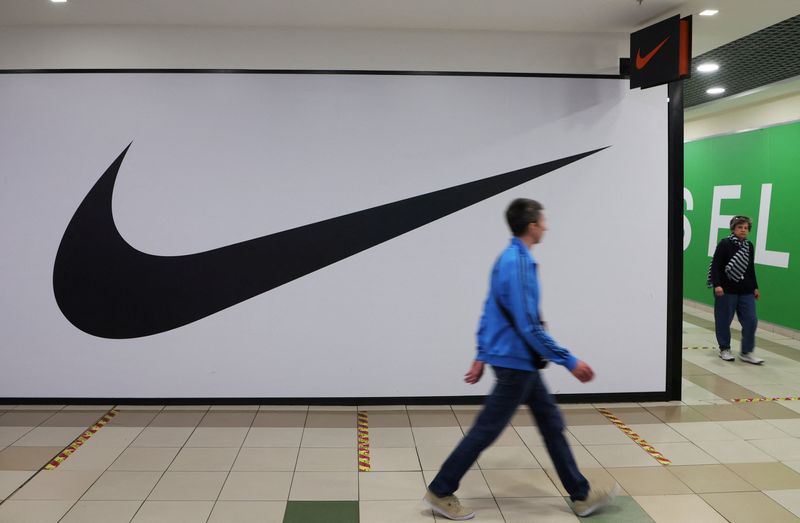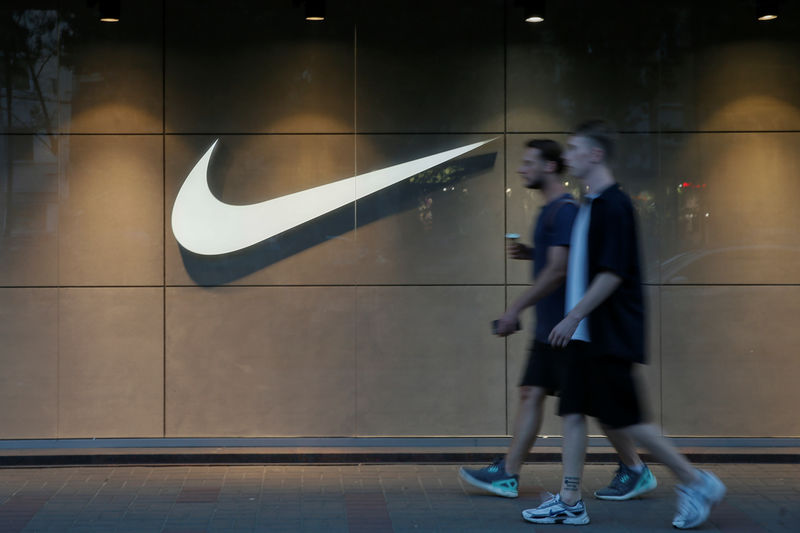By Tassilo Hummel, Gleb Stolyarov, Polina, Nikolskaya and David Gauthier-Villars
PARIS (Reuters) – Nike (NYSE:) stopped selling its sportswear to Russia shortly after Moscow launched its full-scale invasion of Ukraine more than two years ago. But that hasn’t stopped footballstore.ru, an online sports store from the Russian football club Zenit.
Among the dozens of Nike items the site offers are the American sportswear manufacturer’s Phantom GT2 Elite football boots, priced at 29,999 rubles, or about $330.
The man who brought these shoes to Russia is Wijnand Herinckx, a 40-year-old Dutchman living in Moscow. Since the start of the conflict, Herinckx has built a thriving business that provides Russian consumers with Western goods whose makers have withdrawn from Russia.
“Nike does not want their products shipped to Russia,” Herinckx told Reuters in a video call from his office on the outskirts of Moscow, where shelves are packed with boxes of shoes from Western brands. But he added: “They don’t tell us not to do it either.”
Both Nike and Lego told Reuters they have not approved Herinckx’s import of their goods to Russia.
By examining customs records, company records and internal company documents, and speaking to Herinckx himself, Reuters learned how his company sources branded goods including Nike and Lego: it uses middlemen with no apparent connection to Russia as buyers and ships the goods then to Russia. – often via Turkey – and ultimately delivers them to retailers in Russia.
There are at least dozens of companies like Herinckx’s using gray market methods to get Western goods into Russia, according to a Reuters analysis of customs data. His operation shows how attempts by Western governments and brands to isolate the Russian economy collide with a reality of global business: where there is demand, someone will meet it.
Western governments’ restrictions focused primarily on industrial products that could be used to build weapons for the Russian war machine. Such products are generally subject to US and European Union sanctions. Herinckx said his focus is on consumer goods that are not subject to sanctions. Reuters found no evidence that his company violated sanctions.
But companies like Herinckx’s indirectly help the Russian economy: Consumers can still buy foreign goods they have become accustomed to since the collapse of communism over a generation ago. For example, customs data analyzed by Reuters shows that the value of Nike products imported into Russia fell 81% to $21 million in 2022, but recovered to at least $74 million in 2023.
The sportswear giant says it does not supply Herinckx’s company or affiliated companies. “We no longer have Nike-owned physical or digital retail operations in Russia,” the statement said. “We do not ship products to Russia, nor do we allow market partners to distribute products there.” It also said it has a dedicated team to investigate unauthorized distribution channels. A spokesperson did not respond to questions about how the products reached Russia.
In mid-2022, following Moscow’s invasion of Ukraine, Nike announced it was leaving Russia and Lego said it would close its Russian operations.
While global brands halted sales or halted exports due to the invasion, Russia allowed companies to import products from abroad without permission from the trademark owner. Russia said its so-called parallel imports totaled more than $70 billion in the two years to the end of 2023.
Some legal specialists say seeking redress under Russian law would be a challenge for Western brands, leaving few other legal options for brands trying to enforce intellectual property rights typically tied to the territory where the infringement occurred .
The availability of Western brands allows Russian President Vladimir Putin to “project a message that the war is not undermining the ‘normal life’ of the Russian middle class,” said Sergei Guriev, a Russian economist who is provost at Sciences Po University in Paris .
‘TO BE PROUD OF’
Herinckx’s Russian company employs 82 people and expects sales of 35 million euros, or about $37 million, in 2024, he said. Last year, this amounted to $23.7 million, according to company accounts.
At the time of the Russian invasion of Ukraine in 2022, Herinckx worked in the Moscow office of a German company, Hellmann Worldwide Logistics. According to Herinckx, within Hellmann he led a team of more than 20 people that served foreign companies that wanted to sell in Russia without setting up local operations.
Hellmann quickly decided to withdraw from Russia. Herinckx remained seated. He was previously married to a Russian woman with whom he had children, Herinckx said. “Our life is here. Everything we have, we built here,” he said.
He took over one of Hellmann’s Russian entities, renaming it Herinckx Trade Solutions Rus (HTS Rus) and registering it in his wife’s name in April 2022. Herinckx initially used Hellmann’s email servers and a variant of the Hellmann logo in his marketing.
Both Herinckx and Hellmann said they had a transition agreement to let the Dutchman use some of his old employer’s infrastructure. Hellmann said the deal to use the logo expired in October 2022, and the intellectual property was then used without his permission. Herinckx said this was a mistake and he stopped using Hellmann logos in January 2024. Hellmann said it now has no connection with Herinckx’s activities and has no operational activities in Russia.
Among the goods Herinckx’s firm is shipping to Russia are Reebok sneakers and Emporio Armani wristwatches, according to Herinckx and data recorded by a Russian bank that lists assets that HTS Rus has pledged for a loan.
Herinckx said he did not have permission from those two brands. Armani Group says it has halted authorized shipments to Russian distributors and does not know how HTS Rus obtained the products. Reebok’s owner Authentic Brands Group, which said it had suspended all brand stores and e-commerce operations in Russia in 2022, did not respond to a request for comment.
The Dutchman’s company does not publicly identify its customers. But Reuters identified some of its Russian customers by reviewing documents the company filed with Russian tax authorities. Customers included some of Russia’s largest supermarket chains and online retailers.
Herinckx said his company is a good corporate citizen that is also involved in charity work. When asked why he decided to speak publicly about his activities, he said: “What we do is pretty cool, we are proud of it.”
EUROPEAN ROUTE
One of his achievements is importing Lego blocks. The Danish company said it is strictly enforcing its policy of not selling to Russia. If it sells to retailers or distributors, it writes in the contract that they are not allowed to resell to Russia, Herinckx and Lego said.
To get around this, Herinckx said he had deployed a chain of intermediaries between Lego and Russia. Some of the Lego bricks he buys are first purchased from the manufacturer by a company in Europe that has no relationship with his company, he said, declining to name the company. He then buys the bricks from that company, through a Netherlands-registered entity he owns called HTS Europe BV, he said.
The goods are then transported directly from Europe by truck to Russia, passing customs checks along the way, Herinckx said.
Once in Russia, the Lego comes under the control of Herinckx’s Russian company HTS Rus, according to loan records and tax documents. Herinckx told Reuters he supplied Lego to about 48 Russian companies, mainly specialty toy retailers.
“My children play with Lego,” says Herinckx. “I have nothing against other children who play with Lego.”
However, Lego is having problems with its operation.
After Reuters contacted Lego for comment in late April, the Danish company said it had written to HTS Rus accusing it of falsely claiming on its website that it was working with Lego. HTS Rus then changed the English-language version of its website, removing an image of Lego figures and replacing it with generic plastic toys for children. The Russian-language version of the site still carried a Lego logo as of June 13.
“We are concerned about this flow of goods as we stopped shipping LEGO products to Russia in March 2022,” Lego said in a statement to Reuters. “This is an issue that we take seriously and are taking action on, while ensuring we comply with local laws and regulations where we continue to operate.”
TRANSPORTED THROUGH TURKEY
Some Western goods come to Russia via Turkey, a favorite hub for gray market imports. Herinckx said he sources Nike and some Lego products in Turkey through a company called HTS Poer Dis Ticaret Limited Sirketi, which he said sources goods from Turkish retailers or distributors. He declined to name them.
HTS co-founder Poer Murat Erbelger told Reuters the Turkish company had nothing to do with sanctioned products. “We do legitimate business,” he said. Erbelger did not answer questions about HTS Poer’s collaboration with Herinckx Trade Solutions. When asked by Reuters about gray market goods reaching Russia through Turkey, the Turkish Presidency’s Communications Directorate did not respond.
Customs records for the period from June 2022 to December 2023 show that HTS Poer delivered at least $4 million worth of Nike products to Russia. Herinckx told Reuters that, as far as he knew, all those shipments of Nike goods were destined for his company.
Once the Nike products reach Russia, they go to Herinckx’s retail customers. Among them is footballstore.ru, according to tax data and the internal HTS Rus document. Russian company data shows that the shopping site is 100% owned by football club Zenit.
Zenit club is sponsored by Gazprom (MCX:), the Russian state gas company, and is also partly owned by Gazprombank. The lender is subject to US sanctions against the Russian banking sector. Gazprombank, Gazprom and Zenit did not respond to requests for comment.

Reuters purchased the Phantom GT2 Elite Nike football boots from the online retailer. They were delivered 10 days later. Nike did not comment on the shoes.
The shoe box listed the production date as September 2022, three months after Nike said it would stop selling in Russia. There was also a label on which Herinckx’s HTS Rus was listed as the importer.


